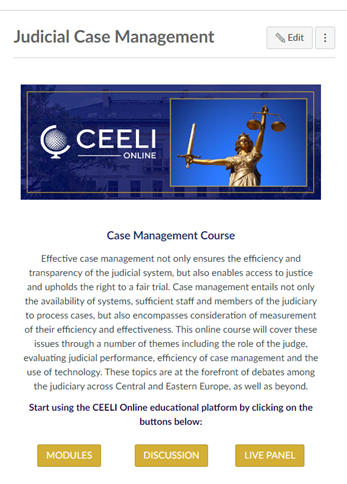Introduction to CEELI and the Value of Online Learning in a Post-Covid World
I arrived in Prague in late May after a slightly tumultuous journey that involved a mad dash sprint through the Frankfurt airport, having to get through customs and run to the farthest possible terminal to catch my connecting flight with 5 minutes to spare. But after all that, driving into Prague, the “city of a thousand spires” and the ever present terracotta roofs on pastel-colored buildings, I was in awe of the architecture and landscape, and excited to arrive at my home for the next few months. I had visited the city once before for a few days but this was a different experience, driving up the steep hills of the city, into Prague 2 slightly away from the busy and touristy old city of Prague 1, and arriving at the CEELI (Central and Eastern European Law Initiative) Institute located in the beautiful park of Havličkovy sady.
CEELI’s own “office” is actually the historic Villa Grebovka situated right above a hillside vineyard, dead center of the park. Once a private home the Villa was renovated in the early 2000s, through CEELI, and is an invaluable location for Judiciary members of the Central and Eastern European regions to gather and progress the rule of law through collaborative work. And the location is perfect for just that, with many rooms and living accommodations on the floors below the offices, the Villa operates as a hub for judiciary members to gather for workshops and events. My temporary room for the beginning of my stay is actually in the building (before moving to another building in the park for the rest of my stay) and, I must say, there is some joy to living right below your office with a quick hop up the stairs to begin your workday. (If you wish to learn more you can read more about the Villa through CEELI’s website here: Villa Grébovka)

(The Villla on a beautiful morning)
One of CEELI’s main mission is “Strengthening Judicial Independence and Integrity” which is done through the Judicial Exchange Networks (more details for both can be found through the following links: Strengthening Judicial Independence and Integrity & Judicial Exchange Network) and my work with CEELI is assisting their Programs division as they continue to put on world class educational workshops for Judiciary members across the region. The workshops, though administrated and produced by CEELI, are lead by judges and experts contribute with lectures and discussions, sharing their own knowledge and experiences to educate others. My first workshop with CEELI is actually an online one that focuses on Judicial Case Management. When COVID hit CEELI was in a prime position to continue their educations programs through online learning, led by (my amazing boss) Dr. Freda Grealy who has expertise in the area of remote learning, and the organization was quick to begin creating the systems and courses for the COVID world. But even as the world opens back up the online learning systems CEELI developed continue to play a key role in facilitating access and availability of their programs to judiciaries.
I arrived in Prague as the Judicial Case Management course was in its fourth of five weeks, but the online system had allowed me access to the course in the weeks leading up to my arrival, a huge benefit from remote learning in being introduced to CEELI’s programs. But witnessing and assisting the course more closely, not having the stress of exams over my shoulder, I was amazed at how online access can facilitate learning, especially in regards to larger topics that benefit from more continuous weekly learning rather than a quick 2-3 day in person workshop. The Judicial Case Management online course was separated into 5 weekly modules that required only around 2.5 hours of work with materials and a 1 hour lecture lead by experts in the respective modules areas. The 5 modules included: The role of the Judge in Case Management, Using Case Management for Court Efficiency, Evaluating Individual Judicial Performance, Role of Information and Communications Technology (ICT) in Case Management, and Contemporary Issues.

(Snapshot of the the online course homepage)
CEELI’s administration of these modules was a masterclass in how to effectively produce online learning that incorporates collaborative aspects from the participants. The Canvas system CEELI uses allowed for organization of materials, that participants accessed in their own times, and forum style portals that allowed for preliminary questions to be discussed by participants prior to the live panels conducted over Zoom. The system works amazingly at driving the discussion to facilitate learning. Some highlights included discussing individual country’s technological case management systems, analyzing what works and what doesn’t, and analyzing the future of technology and Artificial Intelligence in facilitating judicial work.
Additionally the online learning platform allowed for translations and transcriptions of lectures and panels (a main piece of my work for the workshop being correcting and organizing the transcripts) to play a key role in easing accessibility and approachability of the modules for participants who come from all over. The CEELI acronym is actually a bit of a misnomer as the access to their programs is expanding not just for European countries but also for judges from Africa and Asia, with multiple African judges attending the Case Management course. A benefit of putting certain programs online is the ease of access for participants from the ever expanding list of countries.
During COVID the ability to work online was pivotal in keeping the world running, but in a post-COVID world the developments made in online learning still play a role in accessibility and distribution of learning especially in creating programs that do not impede hugely on schedules. The in-person workshops though continue to be a key point of CEELI’s work and I will be discussing the in-person Ethics Workshop CEELI is putting on, and I am assisting, in early June in my next blog post.